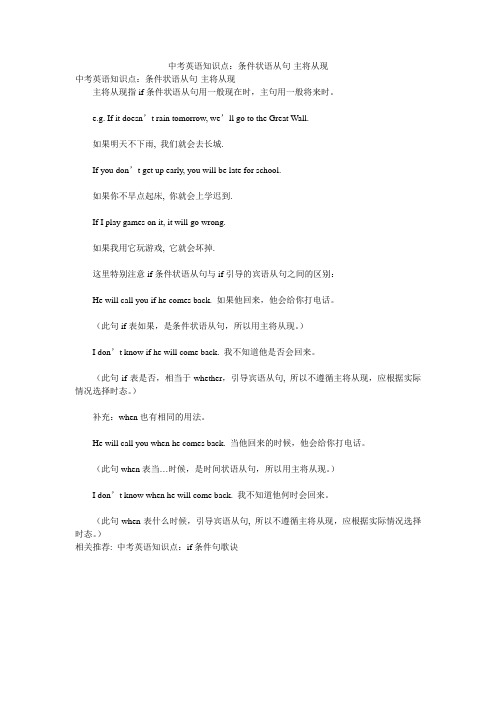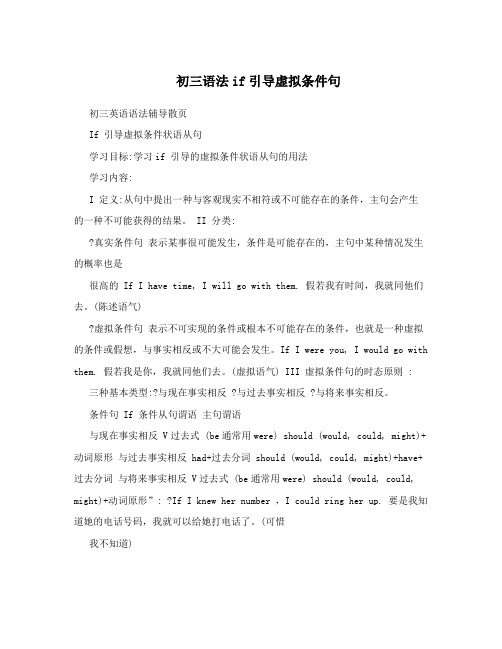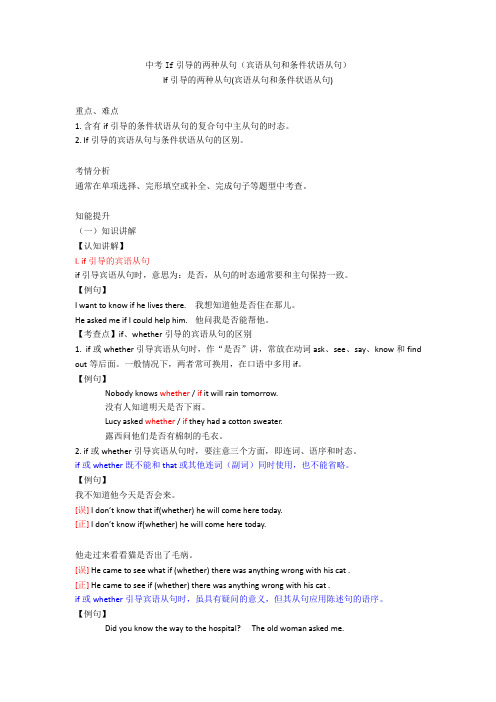中考复习 if条件句
2024年初中英语语法专项学习之if引导的从句用法

2024年初中英语语法专项学习之if引导的从句用法if的条件状语从句的用法1.if引导的条件状语从句,在if引导条件状语从句中要用现在时态替代将来时,类似还有连词before,as soon as,while,when等。
2.零条件句/绝对真实条件句(Zero Conditional)零条件句,又叫绝对真实条件句,用于阐述事实。
用来表达在该条件下,结果一定会如此(如规则,客观规律、真理等)。
结构是:If+主语+do/does,主语+do/does。
其从句和主句的谓语动词通常为一般现在时。
3.第一条件句/相对真实条件句(First Conditional)第一条件句又叫相对真实条件句,谈论将来可能发生的事情,并考虑这件事情的结果。
强调偶然性或一次性的条件,也可以与绝对真实条件句同义。
if从句用一般现在时或其他现在时,表示将来可能发生的事情(条件);主句用一般将来时,表示这件事情的结果。
结构是:If+主语+do/does,主语+will do。
4.第二条件句/现在虚拟条件句(Second Conditional)第二条件句是虚拟条件句的一种,即现在虚拟条件句(Unreal Present),用来表达在现在或将来时间下不太可能或不可能发生的条件,这种条件句还可以用来表示试探性的、委婉的语气(可以理解为不大有自信,所以不太真实的条件)。
结构是:①与将来事实相反的非真实条件句是If+主语+should do/were to do/did,主语+would/should/could/might do;②与现在事实相反的非真实条件句是If+主语+did,主语+would/should/could/might+do。
5.第三条件句/过去虚拟条件句(Third Conditional)第三条件句是表示与过去事实相反的虚拟语气,是用来表达如果(If)当时那样发生,另外一方面(当时)结果会如何。
通常是指过去的事情,带有一切已经太迟而不能够补救的意思。
中考英语知识点:条件状语从句-主将从现

中考英语知识点:条件状语从句-主将从现中考英语知识点:条件状语从句-主将从现主将从现指if条件状语从句用一般现在时,主句用一般将来时。
e.g. If it doesn’t rain tomorrow, we’ll go to the Great Wall.如果明天不下雨, 我们就会去长城.If you don’t get up early, you will be late for school.如果你不早点起床, 你就会上学迟到.If I play games on it, it will go wrong.如果我用它玩游戏, 它就会坏掉.这里特别注意if条件状语从句与if引导的宾语从句之间的区别:He will call you if he comes back. 如果他回来,他会给你打电话。
(此句if表如果,是条件状语从句,所以用主将从现。
)I don’t know if he will come back. 我不知道他是否会回来。
(此句if表是否,相当于whether,引导宾语从句, 所以不遵循主将从现,应根据实际情况选择时态。
)补充:when也有相同的用法。
He will call you when he comes back. 当他回来的时候,他会给你打电话。
(此句when表当…时候,是时间状语从句,所以用主将从现。
)I don’t know when he will come back. 我不知道他何时会回来。
(此句when表什么时候,引导宾语从句, 所以不遵循主将从现,应根据实际情况选择时态。
)相关推荐: 中考英语知识点:if条件句歌诀。
最新中考初中英语if条件句讲解及练习

最新中考初中英语if条件句讲解及练习中考初中英语if条件句讲解及练习【知识要点】定义:常见的if条件状语从句表示在某条件下,某事很可能发生,条件是可能存在的,主句中某种情况发生的概率也是很高的。
E.g. If you ask him,he will help you.如果你请他帮忙,他会帮你的。
E.g. If you fail in the exam,you will let him down.如果你考试不及格,你会让他失望的。
E.g. If you have finished the homework,you can go home.如果你作业做完了就可以回家了。
另外,if从句还表示不可实现的条件或根本不可能存在的条件,也就是一种虚拟的条件或假设。
从句多用一般过去时或过去完成时,表示对现在或过去的一种假设。
E.g.If I were you,I would invite him to the party.如果我是你,我会邀请他参加聚会。
E.g.I would have arrived much earlier if I had not been caught in the traffic.要不是交通堵塞,我本会来得早一些。
另外你还要注意if 条件句的时态搭配1.if从句用一般现在时,主句用一般将来时E.g. If he runs he’ll get there in time.如果他用跑的,他就会及时赶到那儿。
E.g. The cat will scratch you if you pull her tail.如果你拉猫的尾巴,它就会抓你。
2.if从句用一般现在时,主句用may/might/canE.g. If the fog gets thicker the plane may/might be diverted.如果雾在大一些,飞机可能就会改在别的机场降落。
E.g. If it stops snowing we can go out.如果雪停了,我们就可以出去。
if引导的条件句是什么从句

if引导的条件句是什么从句if 引导的条件句有真实条件句和非真实条件句两种;1、真实条件句:叙述真实可能发生的事情;例句:If you fail in the exam,you will let him down.如果你考试不及格,你会让他失望的。
扩展资料2、非真实条件句:虚拟语气的一种,表示与实际已发生事实相反:例句:If I were you, I would invite him.如果我是你,我会邀请他。
3、另一个常用连词为unless,大多数时候意思与 if not 相近:例句:Let's go out for a walk unless you are too tired.我们出去散步吧,除非你太累了。
例句:If you are not too tired, let's go out for a walk.如果你不太累,我们出去散步吧。
条件状语从句的基本用法1、用if引导:if意为“如果”。
例句:If you cheat in the exam you’ll never get away with it.考试作弊必予追究。
2、用unless引导:unless的意思是“如果不”“除非”。
例句:Unless you go at once you will be late.如果你不马上走,就会迟到的'。
3、用as [so] long as引导:as [so] long as的意思是“如果”“只要”。
例句:I’ll remember that day as long as I live.只要我活着,我就不会忘记那个日子。
4、用in case引导:in case用连词引导条件状语从句时,其意为“如果”“万一”。
例句:In case I forget, please remind me about it.万一我忘记,请提醒我一下。
5、条件状语从句的时态:当主句为将来时态或含有将来意义时,条件状语从句习惯上要用一般现在时表示将来意义,而不能直接使用将来时态。
干货:if的11种用法(中考、高考)

干货:if的11种用法(中考、高考)if的12种用法(中考、高考以及稍高些的…)1.主将从现的if:表示经常发生或总是如此——这是目前中考英语常考的条目此种情况下的if后接的从句使用一般现在时或现在完成时,主句可以使用表示将来时的will, shall, can, must等情态动词,也可使用祈使句,be to do等结构。
1)We’ll go if the weather stays fine, but if it rains we’ll stay at home.2)I’ll go there, if I can find time.3)If anyone calls, tell them I’m not at home.4)If I don’t run, the train will have left. 如果我不跑,火车就会开走了。
5)If I’m going to a club, I wear much the same as I w ear for work.去俱乐部的话,我得和上班穿得差不多。
6) Should anyone call (= if anyone calls), please tell them I’m busy. (本条目以前发过)如果有人打电话来,请告诉他我正忙着。
If I stay till May, I’ll have been working here for 20 years.如果我待到5月,我在这儿工作就满20年了。
2.客观事实的if:总会这样,一般规则,客观真理,此时的if相当于when, whenever, every time,表示时间的含义。
(中高考英语不作为考查条目,需要平时了解)Accidents will happen. 意外总是难免的。
If metals gets hot it expands. 金属受热就膨胀。
Plastic will melt if it gets too hot. 塑料太热会融化。
初三语法if引导虚拟条件句

初三语法if引导虚拟条件句初三英语语法辅导散页If 引导虚拟条件状语从句学习目标:学习if 引导的虚拟条件状语从句的用法学习内容:I 定义:从句中提出一种与客观现实不相符或不可能存在的条件,主句会产生的一种不可能获得的结果。
II 分类:真实条件句表示某事很可能发生,条件是可能存在的,主句中某种情况发生的概率也是很高的 If I have time, I will go with them. 假若我有时间,我就同他们去。
(陈述语气)虚拟条件句表示不可实现的条件或根本不可能存在的条件,也就是一种虚拟的条件或假想,与事实相反或不大可能会发生。
If I were you, I would go with them. 假若我是你,我就同他们去。
(虚拟语气) III 虚拟条件句的时态原则 : 三种基本类型:?与现在事实相反 ?与过去事实相反 ?与将来事实相反。
条件句 If 条件从句谓语主句谓语与现在事实相反 V过去式 (be通常用were) should (would, could, might)+动词原形与过去事实相反 had+过去分词 should (would, could, might)+have+过去分词与将来事实相反 V过去式 (be通常用were) should (would, could, might)+动词原形”: ?If I knew her number ,I could ring her up. 要是我知道她的电话号码,我就可以给她打电话了。
(可惜我不知道)If I’d left sooner,I’d have been on time. 要是我早点动身,我就准时到了。
(但我动身太迟了) ?If I asked him,I’m sure he’d help us. 如果我向他提出要求,肯定他会帮助我们。
(不过我不打算这样做)做题技巧:“后退一步法” 在准确地判断了该句与哪一事实相反后,按虚拟语气的后退一步法处理从句谓语动词的时态。
中考If引导的两种从句(宾语从句和条件状语从句) (4)

【例句】
我不知道他今天是否会来。
[误]I don’t know that if(whether) he will come here today.
[正]I don’t know if(whether) he will come here today.
如果明天下雨,我们就不去长城了。
(3)在if引导的条件状语从句中,当主句是一般将来时时,不能使用be going to结构,而要用will。
【例句】
I’ll help you with your English if I am free tomorrow.
如果明天我有空,我会帮助你学英语。
(4)在if引导的条件状语从句中不能使用some,而要用any。
他走过来看看猫是否出了毛病。
[误]He came to see what if (whether) there was anything wrong with his cat .
[正]He came to see if (whether) there was anything wrong with his cat .
如果你想去溜冰,穿上暖和的衣服。
如果主句是一般将来时,从句必须用一般现在时。
【例句】
You will be late for school if you get up late.
如果你起晚了,你上学将迟到。
If it rains tomorrow, we won’t go to the Great Wall.
我想知道它是不是好消息。
在介词后,只能用whether:
【例句】
His father is worried about whether he loseshis work.
中考英语由-if-和unless-引导的条件状语从句

由if 和unless 引导的条件状语从句1. If we lose our short-term memory, we forget things happening recently.译:______________________________________________________2. If the picture is silly, strange and colorful, you will remember it better.译:______________________________________________________A: If sentences: actions with definite results. 有必然结果发生的行动eg: ①If you go into a clothes shop, you find clothes.②If you go into a car showroom, you see cars.③Water turns into ice if you cool it.④The wood floats if you put it into water.Conclusion:1). 如果if 条件句谈论的是重复发生和预示必定要发生的情景和事件,则主从句大多用一般现在时态。
2). 在if 条件句中,if 条件从句可以放在前面,也可以放在后面。
当if 引导的条件从句放在前面时,后面常用逗号隔开。
B: If sentences: actions with possible results. 有可能性结果发生的行动eg: If you ask him,he will help you.如果你请他帮忙,他会帮你的。
If you fail in the exam,you will let him down.在if 引导的条件状语从句中,如果从句谈论的是一个有可能发生的事实及其产生的相关的结果,主句用一般将来时态,从句用一般现在时态。
- 1、下载文档前请自行甄别文档内容的完整性,平台不提供额外的编辑、内容补充、找答案等附加服务。
- 2、"仅部分预览"的文档,不可在线预览部分如存在完整性等问题,可反馈申请退款(可完整预览的文档不适用该条件!)。
- 3、如文档侵犯您的权益,请联系客服反馈,我们会尽快为您处理(人工客服工作时间:9:00-18:30)。
教案讲义学生:任课教师:If条件状从句练习巩固练习一、单项选择()1.If you _____ to the party, you’ll have a great timeA. will goB. wentC. goD. going()2.–What are you going to do tomorrow? --We’ll go to the library tomorrow if it ___.A. isn’t rainB. rainC. won’t rainD. doesn’t rain()3. What will you do if you _____ to the old folk’s home visit?A. goB. wentC. goingD. will go()4. If I eat ____ food, I’ll be very fat.A. too manyB. many tooC. too muchD. much too()5. I’ll give the book to him if he ___ here next Sunday.A. will comeB. comesC. is comingD. came()6. I ____ her the answer if she ____me.A. can tell, will askB. will tell, will askC. would tell, askD. will tell, asks()7. We’ll go to the farm and help the farmers with the apple-picking if it ____ tomorrow.A. won’t rainB. will be rainyC. doesn’t rainD. isn’t raining()8. There is going to _______ a sports meeting next week. If it ________, we’ll have to cancel it.A. be, will rainB. have, will rainC. be, rains()9. Your teacher will be unhappy if you _______ to school late.A. comeB. will comeC. are comingD. came()10.I don’t know if he __. If he __ , please let me know.A. comes, comesB. will come, will comeC. will come, comesD. comes, will come()11.You will stay healthy _______ you do more exercise, such as running and walking.A. ifB. howC. beforeD. where()12. If she here tomorrow, I will tell you.A. comesB. will comeC. comeD. came()13. I’m waiting for my friend. , I’ll go shopping alone.A. If she comesB. If she doesn’t comeC. If she won’t come()14. —Tom wants to know if you will have a picnic tomorrow. —Yes. But if it ______, we’ll play chess instead.A. will rainB. rainedC. is rainingD. rains()15. If Tom _____ the game, we'll give him a surprise".A. winB. winsC. wonD. miming二、用所给词的适当形式填空。
1.If you ________(feel) tired, you _________ (have) to have a rest.2. Where _____ he ____(see) the film if he _________(have) time?3. If there ____(be) fewer trees, there _______( be) more pollution.4. He ___(dress) more casually if he ___( not work) on weekends.5. If Marcia _______(live) alone, she _______( keep) a pet parrot.6. Lana _____ buy) a new dress if the old one ____(be) out of style.7.The twins _______(fight) if they__________(argue).8. I ______(have) a bake sale if I ____(need) money for education.9. Peter ____( send) me a beautiful souvenir if he ____(tour) Spain.10. If Mr Green _______ (say) I am hard- working, my parents ___( feel) glad.11.I ______(go) to the beach if it________ ( not rain) this week.12. _____they ___( have) a match if the P.E. teacher __(be) busy?13.He ____(write) a letter to his grandparents if he ____(get) his report card this week.14. If she ______(get) up late, she _____ ( not catch) the early bus.15. Peter ____(major) in English if he ____(pass) the exams in Peking University.三.完成句子。
1.如果他到的晚了会发生什么事情?What ______ _____ if he ____ late?2. 如果努力学习,你就会取得好成绩。
If you______ _______, you _____ ____good _______.3. 他如果看电视太久了,他的父母会不高兴。
If he _____ TV too much, his parents _____ _________unhappy.4. 如果我们为他组织生日聚会,大家都会来的。
Everyone _____ _____ if we _______a birthday party ________ him.5.如果明天不下雨,我会和你一起去公园的。
If it _____ ______tomorrow, I _____ go to the park ______you.6. 如果她睡过头了,就会旅游迟到的。
he____ ___ ___ ___ the trip if she _____7. 如果他有空,他会帮助你的。
If he ____ ____ , he ______ ____ you.8. 如果Tom考试不及格,他就没有机会上高中了。
Tom ______have the _____to go to the high school if he ________the exams.9. 你如果抄同学的作业就不能学好各门功课。
You _____ ____ good at all the subjects if you ______ the other students’ homework.10.如果你上课睡觉,老师会生气。
If you______ in class, your teacher ____ ____ ____直接引语变间接引语练习题:1. “I never eat meat.” he said.He said that ______ never ______ meat.2. “I’ve found my wallet.” he said to me.He ______ me that he ______ ____________wallet.3. “You must come here before five.” he said.He said that I ______ to go ______ before five.4. “Don’t tell him the news.” she said.She told me _______ ______ ______ him the news.5. “Stop making so much noise, ch ildren.” he said.He ______ the children ______ ______ making so much noise.6. “Are you interested in this?” he said.He ______ ______ I was interested in ______.7. “Do you know where she lives?” he asked.He asked ______ ______ knew where she ______.8. “Where have you been these days?” he asked.He asked me _______ _______ _______been _______ days.9. He asked, “How did you find it, mother?”He asked her mother ______ ______ ______ found it.。
